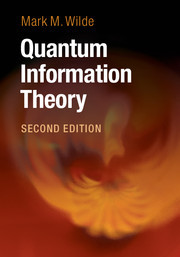Description
Quantum Information Theory (2nd Ed., New edition)
Author: Wilde Mark M.
Introduces many concepts and mathematical tools in quantum information theory, with over 100 pages of new material and exercises.
Language: English
Subject for Quantum Information Theory:
Approximative price 82.72 €
In Print (Delivery period: 14 days).
Add to cart
Publication date: 02-2017
Support: Print on demand
Support: Print on demand
Description
/li>Contents
/li>Biography
/li>
Developing many of the major, exciting, pre- and post-millennium developments from the ground up, this book is an ideal entry point for graduate students into quantum information theory. Significant attention is given to quantum mechanics for quantum information theory, and careful studies of the important protocols of teleportation, superdense coding, and entanglement distribution are presented. In this new edition, readers can expect to find over 100 pages of new material, including detailed discussions of Bell's theorem, the CHSH game, Tsirelson's theorem, the axiomatic approach to quantum channels, the definition of the diamond norm and its interpretation, and a proof of the Choi?Kraus theorem. Discussion of the importance of the quantum dynamic capacity formula has been completely revised, and many new exercises and references have been added. This new edition will be welcomed by the upcoming generation of quantum information theorists and the already established community of classical information theorists.
Preface to the second edition; Preface to the first edition; How to use this book; Part I. Introduction: 1. Concepts in quantum Shannon theory; 2. Classical Shannon theory; Part II. The Quantum Theory: 3. The noiseless quantum theory; 4. The noisy quantum theory; 5. The purified quantum theory; Part III. Unit Quantum Protocols: 6. Three unit quantum protocols; 7. Coherent protocols; 8. Unit resource capacity region; Part IV. Tools of Quantum Shannon Theory: 9. Distance measures; 10. Classical information and entropy; 11. Quantum information and entropy; 12. Quantum entropy inequalities and recoverability; 13. The information of quantum channels; 14. Classical typicality; 15. Quantum typicality; 16. The packing lemma; 17. The covering lemma; Part V. Noiseless Quantum Shannon Theory: 18. Schumacher compression; 19. Entanglement manipulation; Part VI. Noisy Quantum Shannon Theory: 20. Classical communication; 21. Entanglement-assisted classical communication; 22. Coherent communication with noisy resources; 23. Private classical communication; 24. Quantum communication; 25. Trading resources for communication; 26. Summary and outlook; Appendix A. Supplementary results; Appendix B. Unique linear extension of a quantum physical evolution; References; Index.
Mark M. Wilde is an Assistant Professor at the Department of Physics and Astronomy and the Center for Computation and Technology at Louisiana State University, Baton Rouge. He is the recipient of a National Science Foundation Career Development Award and the APS-IUSSTF Professorship Award in Physics. He is also a Senior Member of the IEEE, and is currently serving as Associate Editor for Quantum Information Theory for the leading journal IEEE Transactions on Information Theory. His current research interests are in quantum Shannon theory, quantum optical communication, quantum computational complexity theory, and quantum error correction.
© 2024 LAVOISIER S.A.S.

